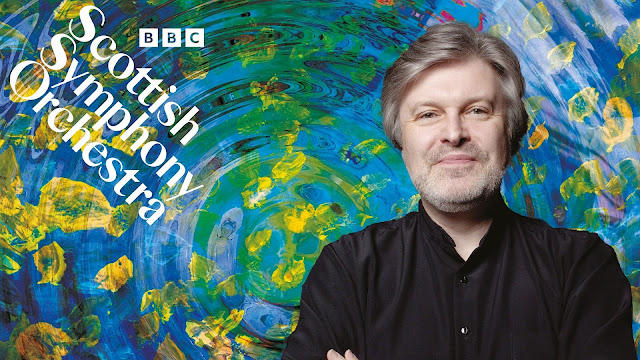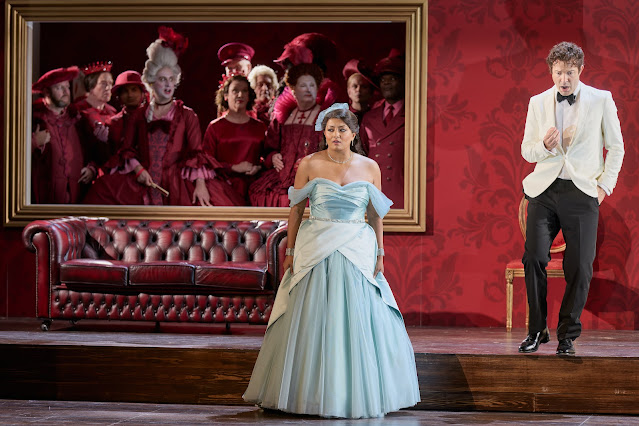 |
| Rossini: La Cenerentola (Cinderella) – Deepa Johnny, Charles Rice – English National Opera (Photo: Mark Douet) |
Rossini: La Cenerentola (Cinderella); Deepa Johnny, Aaron Godfrey-Mayes, Charles Rice, Simon Bailey, David Ireland, Isabelle Peters, Grace Durham, director: Julia Burbach, conductor: Yi-Chen Li, English National Opera; London Coliseum
Reviewed 9 October 2025
A modern updating done with wit and imagination that still kept the focus on the two lovers, here played with great charm and stylistic brio in an engaging performance
Rossini’s comic opera La Cenerentola (Cinderella) presents a number of challenges for modern opera companies. First off there is the obvious one, the finding of singers who can bring off the technical bravura that the roles require, thankfully there seems to be no shortage of Rossini stylists amongst young singers. Then there is the length, modern audiences do not expect comedy to last as long as tragedy, so performers and directors have to work hard to keep our attention.
Those first two comments apply generally to Rossini’s comedies, but there is a particularity to La Cenerentola. First off, there is the eschewing of the fairy tale elements by Rossini and his librettist, along with British audiences fondness for the pantomime version. Frederick Ashton showed us how these various elements can live side by side in his brilliant ballet, and directors often tweak the role of Alidoro to make him something a little bit more. Another problem is that Rossini wrote only for male chorus. This was for a practical reason, Italian opera houses kept the male chorus on the books with the women being part time. The result is to make Ramiro’s residence something of a bizarre boys club. There is also a homo-erotic theme in there somewhere, but I have yet to see a production that took that particular route.
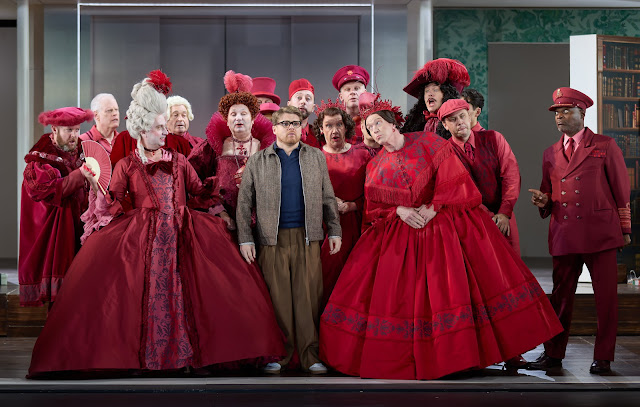 |
| Rossini: La Cenerentola (Cinderella) – Aaron Godfrey-Mayes – English National Opera (Photo: Mark Douet) |
On Thursday 9 October 2025 we finally caught up with Julia Burbach‘s production of Rossini’s La Cenerentola (Cinderella) for English National Opera at the London Coliseum. The conductor was Yi-Chen Li, set designs were by Herbert Murauer, costumes by Sussie Juhlin-Wallen, lighting by Malcolm Rippeth, video by Hayley Egan and choreography by Cameron McMillan. Canadian mezzo-soprano Deepa Johnny was making her ENO debut as Cinderella, with tenor Aaron Godfrey-Mayes, a recent member of Hamburg opera studio, as Ramiro, Charles Rice (seen earlier this year in Buxton’s Bernstein/Poulenc double bill, see my review) as Dandini, Simon Bailey (a notable Wotan in Dresden Music Festival’s historically informed Die Walküre, see my review) as Don Magnifico, David Ireland as Alidoro and Isabelle Peters and Grace Durham as the sisters, Clorinda and Tisbe. The eighteen men of the chorus were joined by a team of six dancers including Sarah Storer as the ghost of Cinderella’s mother, plus ten children.
The setting was modern, with Herbert Murauer’s imaginative, two storey set managing to provide a wide selection of settings. It also had the advantage of giving the singers a significant backdrop for resonance and reducing the stage area, albeit at the expense of creating an acting area too wide for its depth but then the London Coliseum is never ideal for this type of opera.
The lift that linked the two levels was far more than that; there were plenty of moments where it was used to bring an element of the supernatural. This was emphasised by the treatment of Alidoro (David Ireland), here a rather self-satisfied master of disguise who was clearly much more than he seemed and was in cahoots with the ghost of Cinderella’s mother. Add in a host of mouse ‘helpers’ and you get the idea. There was magic in the air.
Burbach’s approach to the male chorus was genuinely innovative, though it did rather suggest she had been watching too many performances of Gilbert & Sullivan’s Ruddigore. Here the chorus played the ghosts of the Ramiro’s ancestors, all dressed in red and with many of the men kitted out as women (with a distinctly Monty Python feel to the whole thing).
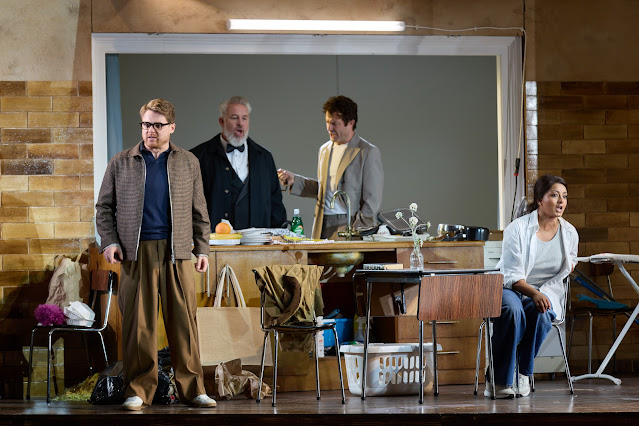 |
| Rossini: La Cenerentola (Cinderella) – Aaron Godfrey-Mayes, Simon Bailey, Charles Rice, Deepa Johnny – English National Opera (Photo: Mark Douet) |
Yet amidst all this, Burbach’s treatment of her characters was entirely serious. For all the hi-jinks, we never lost sight of the fact that this was a story about the connection between Aaron Godfrey-Mayes delightfully nerdy Ramiro and Deepa Johnny’s poised, stylish and wonderfully warm Cinderella.
Deepa Johnny brought a mix of bravura style and vocal heft to the role of Cinderella. The warmth of her personality shone through from the outset. This Cinderella was slightly less downtrodden, a skivvy but there were no cinders. She elicited sympathy from the audience and there was a real connection with Aaron Godfrey-Mayes’s Ramiro in their first scene together. Yet Johnny also gave us plenty of Rossinian pizzaz, albeit with a gentle touch to the passagework. By the time of her final aria, which was the show-piece intended, we were captivated. As was Aaron Godfrey-Mayes’s Ramiro. He made Ramiro as Dandini into an appealingly nerdy character, and the slowness of the interaction between the two became entirely understandable. But Godfrey-Mayes also has a robust lyric tenor voice that gave Ramiro’s music some heft. Unflinching in his high-notes. Godfrey-Mayes added a bit of vocal thrill to the part without over-egging it. He sang Ramiro at Longborough in 2023 and I rather want to hear him in some of the Andrea Nozzari roles in Rossini’s serious operas.
Charles Rice made an engaging Dandini, having great fun with the character’s impersonation of his master. Rice invested his performance with a wonderful sense of glee, along with a vivid stage personality. All this meant that we were totally carried away and any suspicion that Rossini’s fast passagework did not come easily were brushed away. It helped that Rice gave a suggestion of depth to the character, he wasn’t as shallow as some.
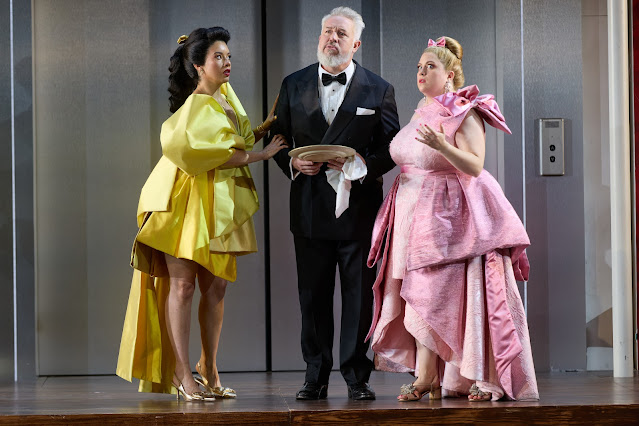 |
| Rossini: La Cenerentola (Cinderella) – Isabelle Peters, Simon Bailey, Grace Durham – English National Opera (Photo: Mark Douet) |
Cinderella’s family were played with great elan by Simon Bailey, Isabelle Peters and Grace Durham. They were definitely over the top, yet not quite as horrible as they could be. Certainly the nastiness to Cinderella was more muted here. The moment in Act One when Bailey’s Don Magnifico says that his third daughter was dead was hardly a shocking moment. Peters and Durham brought a sense of glee and visual virtuosity to their roles, you felt the two singers were having fun with these horrors, yet both singers were stylists and there was much to enjoy. Simon Bailey’s Don Magnifico was a surprisingly warm character, less nasty and less of a failure than some. Bailey seemed a natural in Rossini’s tricky vocal writing (no bad going for a distinguished Wotan), but invested the role with a sympathy too, more underdog than vicious.
Overseeing it all with clear sense of self-satisfaction was David Ireland’s Alidoro. Ireland sang the role admirably, and we enjoyed his occasional solo moments but in addition he seemed to spread character over the whole stage and really conveyed the sense that this Alidoro was indeed a deus ex machina.
The chorus had great fun as the ancestors, crowding out Ramiro and generally filling up the space, and it was clear that this enjoyment carried over into the music (and movement too – there was dancing). All in all a rather clever idea enjoyably executed. Having long thought that Gilbert & Sullivan’s Ruddigore would make for a nice pairing with Britten’s Owen Wingrave, Julia Burbach’s ideas for La Cenerentola add a third ancestor-driven opera to the mix.
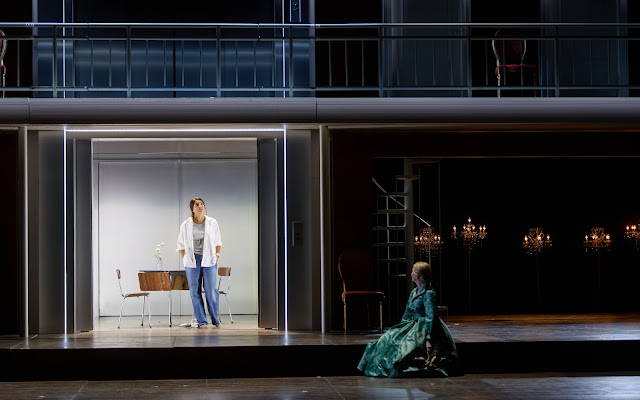 |
| Rossini: La Cenerentola (Cinderella) – Isabelle Peters, Simon Bailey, Grace Durham – English National Opera (Photo: Mark Douet) |
The cast included six dancers. One, Sarah Storer, played Cinderella’s mother though the character seemed to have no real function except as a side-kick for David Ireland’s Alidoro, and to give indication that as the man was pally with a ghost he was no ordinary mortal. The other dancers played Clorinda and Tisbe’s rackety friends in the opening scenes and then party goers, giving the work much needed colour and movement.
The opera was sung in Christopher Cowell’s new translation where his penchant for modernisms and ugly colloquial phrases was balanced by the sheer inventiveness of his rhymes. It is a translation that will date quickly, and Cowell’s syllables in the patter songs made me rather sorry for the singers, Simon Bailey in particular.
In the pit, Yi-Chen Li and the orchestra played Rossini’s score with a will. From the stalls, balance was excellent and Li’s steadiness of hand ensured that the work played well in the London Coliseum acoustic. There were plenty of lovely moments and some fine instrumental playing, but overall I worried that her approach was too steady and that a bit of risk, a bit more light and shade might have been in order.
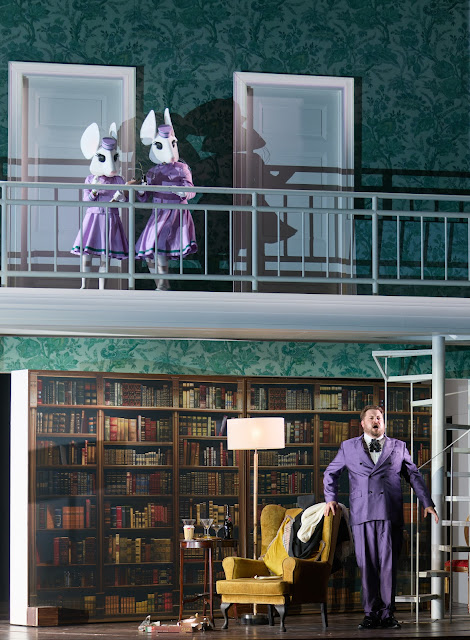 |
| Rossini: La Cenerentola (Cinderella) – David Ireland – English National Opera (Photo: Mark Douet) |
Julia Burbach’s production succeeded in bringing the story into the modern age without doing violence to the dramaturgy and with a great deal of imagination. More, she concentrated on the characters themselves and winning performances from the two leads, plus a great comic turn from Charles Rice, along with terrific supporting cast ensured that the performance engaged in all the right ways.
The blog is free, but I’d be delighted if you were to show your appreciation by buying me a coffee.
Elsewhere on this blog
- No easy options: Estonian Philharmonic Chamber Choir & Tallinn Chamber Orchestra celebrate Arvo Pärt at 90 at Barbican – concert review
- Dresden-born composer, Sven Helbig’s Requiem A marks the 80th anniversary of the ending of World War II – concert review
- Political resonances & sheer poetry: English Touring Opera on strong form in Britten’s The Rape of Lucretia – opera review
- Sara Cortolezzis makes her debut at Covent Garden in Verdi’s Les vêpres siciliennes conducted by Speranza Scappucci – opera review
- Reformation: Mishka Rushdie Momen on mixing Renaissance piano music with later periods at the London Piano Festival – interview
- Strong emotions, vocal virtuosity : Rossini’s Ermione & Stabat Mater with Jakob Lehmann & Orchestra Révolutionnaire et Romantique – concert review
- Explaining the unexplainable: a magical album from Lotte Betts-Dean, Dimitris Soukaras, everything you’ve ever lived on Delphian – record review
- Clarinet & strings: Coleridge-Taylor & a new Jago Thornton piece from Sacconi Quartet & David Campbell at Conway Hall – concert review
- Letter from Florida: Tianyi Lu conducts Bartók & Brahms with Lukas Vondracek & New World Symphony – concert review
- Home


%202025%20©%20Mark%20Douet.jpg?w=998&resize=998,665&ssl=1)
